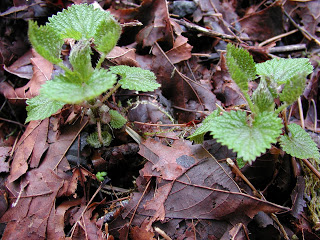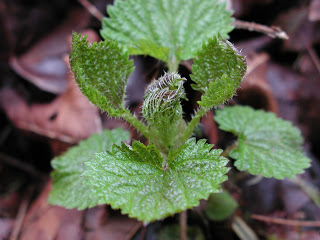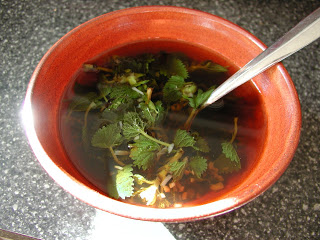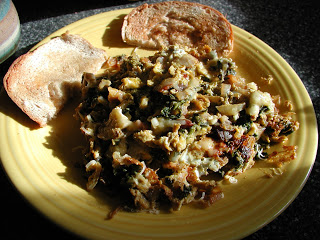There is no other plant I have loved and loathed as much as the stinging nettle. As a child, we avoided these troublesome plants for the itching welts they gave on our legs should we carelessly brush against one while playing in the woods. We just plain did not like them, and the idea that they might be a food never crossed our minds. In fact, if someone had ever told me I would plant them in my garden one day, I would definitely have not believed them.
When I was about 25, I ate nettles for the first time while visiting a friend of mine at the organic farm where he worked. With the promise of a hearty breakfast, we ventured out to the edge of the recently plowed field, where he gathered great handfuls of them with gloved hands. Then he scrambled them up with some farm fresh eggs while I eyed the breakfast situation with skepticism. Not wanting to be accused of lacking a sense of food adventure, I tried them, and found it to be one of the tastiest breakfasts I had ever had. The cooking broke down all the little spines, causing no ill effects to my mouth, and I was amazed by the rush of energy they gave me for our hike that day. It was better than coffee! I was hooked on nettles right then and there.
So, you might be wondering what is so special about nettles and why they are so good for you. Nettles contain large amounts of amino acids, glucidic substances, amines, sterols, cetones, volatile oils, fatty substances, sitosterols, formic and acetic acid, panthotenic acid, and folic acid. They are also chalk-full of vitamins like C, B2 and K, beta-carotene, calcium, magnesium and iron. Nettles are useful in treating a wide variety of health issues including arthritis, urinary tract infections, conditions of the spleen, diabetes, anemia, allergies, viruses, stress and fatigue. They are truly a super food.
When I started taking Wild Food Adventures classes with John Kallas in Portland, nettles came up often as an important food source. He insisted that we should throw our faint-hearted inhibitions out the door and grab them with our bare hands like a real man. I tried this many times and decided that wasn’t going to work for me. Numb fingers for days was something I just couldn’t cope with, when garden gloves are so easy to bring along. I decided to leave the stoic wildcrafting practices to John, and make things easier for myself. I always wear gloves.
Last year I went out nettle harvesting all throughout the Spring, in the mountains, in parks by the river, and along Forest Service roads, and dried as many as I could for the Summer and Winter months. Dried nettles are excellent as a tea, as an addition to soups, and in rice dishes. I also dug up some rhizomes and planted them in my garden to get a nice nettle patch of my own going. It did really well, and I anticipate a good source of fresh greens this Spring right out my back door.
With the warm weather we’ve been having the last couple of weeks, I noticed the nettles were starting to push up from under the leaf mulch in my garden. I decided to stop and check one of my nettle spots in the Coast Range on my way out to visit some friends, and sure enough, I found the most tender, juicy nettles sprouting up from the forest floor. Eureka!
Now, if some of you are reading this and wondering what to do with a nettle should you ever happen across some, here are a few simple ideas for my favorite recipes. They can get much more elaborate too. I know some folks who made nettle pesto and nettle beer last year. The possibilities are numerous.
Nettle tea is the easiest thing to make. Simply boil water and steep some nettles in a mug or mason jar until the water turns a very pale green. It has a wonderful flavor and aroma, and I find it revitalizing on cold days in the early Spring.
Nettle broth is another treat. I boil the nettles for about 20 minutes with some diced onion or dried onion flakes. Then I add a little sea salt and tamari, and slurp it down.
An all-time favorite breakfast or lunch is nettle scramble. I saute them in butter and a little white wine until they are very limp and the spines have broken down. Then I add some diced bacon and eggs, and maybe a little raw blue cheese on top. This, my friends, is the true breakfast of champions.
You’ll feel like a superhero after eating this plant.





i love this- i have developed a deep fondness for stinging nettle. just last night at the grocery store i overheard a couple laughing at the traditional medicinals nettle tea, "drink this and get a rash!" i couldn't help but laugh- oh they don't know what they're missing!!! it might be my favorite plant. i am so going to plant some in my garden someday- for now i have my secret coast range patch too. i have heard there are ways to pick it without getting stung but i'm with you- i wear gloves. 🙂 and i am not going to listen to carla emery (encyc of country living) who claims she can think of no good reason to intentionally plant this amazing plant! 🙂
I so want to find stinging nettle. I know it grows 'round here, but I've never been sure if what I'm looking at is nettle or not. I'd like to eat it and also use it as a conditoner for my hair.
You could Google some plant ID pages for nettles, and a surefire test is to pinch the stem with your fingertips. If it burns and stings, you've probably got nettles. I also hear they're great for hair!
Just bought Hank Shaw's new book "Hunt Gather Cook" and have begun the process of foraging. I love your blog!
For a long time, I have been interested in using local wild plants for their various uses. Fear of grabbing some poisonous similar looking plant prevents me from doing that. Once I have space (small apartment in Roseburg) for a garden, I will be asking those with more knowledge for starts for all sorts of things I probably pass by every day.
Fortunately, there are a lot of very safe wild plants around here without poisonous look-alikes. There are a lot of good classes and resources up around Eugene too, which isn't too far of a haul for you. I had a great wild plants teacher in Portland, John Kalas, who you could check out at http://wildfoodadventures.com. Getting a wild plant garden going once you have space is a great idea.
Thank you so much such an informative blog on Stinging Nettles. I admire your work.
I'm glad you enjoyed it! I love sharing nettles.